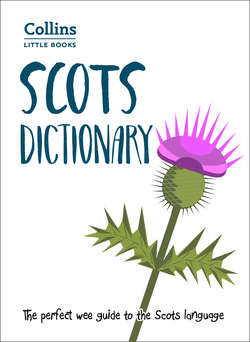Читать книгу Scots Dictionary: The perfect wee guide to the Scots language - Collins Dictionaries, Collins Dictionaries - Страница 25
Оглавлениеchitterin’ bite
chitterin’ bite A chitterin’ bite is a snack or sweet eaten immediately after a swim. It is supposed to prevent one from catching a cold.
chocolate In the Glasgow area, the phrase if he was chocolate he’d eat himself is sometimes used of a person who is conceited or boasting about his achievements.
chuckie or chuckie stane A chuckie is a stone or pebble of throwable size: throwing chuckies in the water.
chuddie Chuddie is a name for chewing gum.
chum To chum a friend means to accompany them somewhere: I’ll chum you along to the bus stop.
chunty heid In Northeast Scotland, a chunty heid is a stupid person.
church officer or kirk officer Another name for a beadle.
Church of Scotland The Church of Scotland is the established church in Scotland. It has a Presbyterian structure, with each congregation being governed by an elected body of elders, and a Calvinist doctrine. The Church of Scotland has the largest membership of any church in Scotland. The secession of the Scottish Church from Rome took place in 1560 under the leadership of John Knox. In 1840, in what came to be known as the Disruption, a split took place among Scotland’s Presbyterians and some members of the Church of Scotland left to form the Free Church. See Kirk.
chute (shoot) A chute is a playground slide.
City Chambers In Glasgow, Edinburgh, and Dundee, the City Chambers is the seat of municipal government.
clabber or glabber In Southwest Scotland, clabber is a word for mud, earth, or clay. [The word comes from the Gaelic clàbar meaning mud or a puddle]
clachan (klaCH-an) A clachan is a small village or hamlet. Clachan, being a Gaelic word, was first used of only Highland villages, but its use is now more widespread. [The word is Gaelic and means stone]
clack or claick In Northeast Scotland, clack is gossip or chat. To clack is to gossip or chat. [This sense probably developed from one of its original meanings: the clattering sound a mill makes when in motion]
Clackmannanshire (clack-man-an-sher or clack-man-an-shire) Clackmannanshire is a historic county in East Central Scotland at the northwest end of the Firth of Forth. It is now the name of a council area occupying much the same area as the old county.
claes (klaze) Claes are clothes. The saying back to auld claes and porridge means a return to normality after a period of jollity, celebration, or indulgence: After Hogmanay it’s back to auld claes and porridge for us.
claik See clack.
claim In Glasgow, to claim someone is to announce one’s intention to beat them up: You’re claimed after school.
clan In Scotland, a clan is a group of families with a common surname united under a single chief. Each clan member is, theoretically, descended from a single ancestor from whom the name of the clan derives. Members often bear the name of the founder preceded by Mac-, a Gaelic term for ‘son of’: MacDonald. The clan system went into terminal decline in the years following the suppression of the 1745 Jacobite rebellion and the process was accelerated by the Clearances, which forced large numbers of Highland Scots abroad to countries such as the USA, Canada, and Australia. Many of the descendants of these emigrants are proud of their Scottish ancestry and some occasionally return to Scotland for clan gatherings. [The word is from the Gaelic clann family]
clanjamfrie (clan-jam-free) or clamjamfrie Clanjamfrie is a word used to refer disparagingly to a group of people, especially if one considers them a rabble. A clanjamfrie is also a varied assortment of things; a mixed bag: The clamjamfrie of tenements, courtyards, and closes which forms Edinburgh’s Old Town.
